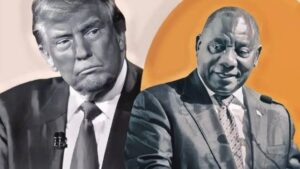**Washington D.C., U.S.** — The Trump administration announced today the termination of all financial aid to South Africa, citing concerns over alleged attacks on white farmers and contentious land redistribution policies. The move has drawn sharp criticism from Pretoria, human rights groups, and international observers, who warn of escalating diplomatic tensions and humanitarian consequences.
**Key Details**
In a statement released by the White House, President Trump accused South Africa’s government of failing to protect minority communities, specifically referencing reports of violent attacks on white farmers and the acceleration of land expropriation without compensation (EWC) policies. “The U.S. cannot support a government that turns a blind eye to human rights violations and seizes private property unlawfully,” the statement read.
South Africa, which received approximately $500 million annually in U.S. aid—primarily for healthcare initiatives like PEPFAR (HIV/AIDS programs)—now faces an abrupt end to this funding. Analysts note that the decision risks destabilizing critical public health efforts in a nation with one of the world’s highest HIV prevalence rates.
**Context and Controversy**
Land reform has been a polarizing issue in South Africa since the end of apartheid, with the African National Congress (ANC) government pledging to address historic inequities in land ownership. Current policies aim to transfer agricultural land from white landowners—who control roughly 70% of farmland—to Black South Africans. However, progress has been slow, and allegations of illegal seizures and violence against farmers have fueled international debate.
South African President Cyril Ramaphosa condemned the U.S. decision as “reckless and politically motivated,” arguing that land reform is a constitutional process. “Our nation is committed to resolving historical injustices through legal means. This move undermines South Africa’s sovereignty and our partnership with the U.S.,” he stated.
**Reactions and Analysis**
Human rights organizations, including Amnesty International, criticized the aid cuts as a disproportionate response that harms vulnerable populations. “Punishing millions over a complex domestic policy issue is misguided. Health programs, not political agendas, should dictate aid,” said a spokesperson.
Meanwhile, advocacy groups representing South Africa’s white farmers, such as AfriForum, applauded the move, claiming it “sheds light on a humanitarian crisis.” The organization has long accused the ANC of tacitly supporting farm murders and land grabs—allegations the government denies.
**Global Implications**
The decision adds strain to U.S.-South Africa relations, already tested by trade disputes and divergent foreign policy stances. Critics argue the Trump administration’s stance oversimplifies a nuanced issue, while supporters frame it as a defense of property rights.
As tensions rise, experts warn that China and Russia could seek to expand influence in South Africa, filling the void left by diminished U.S. engagement.




